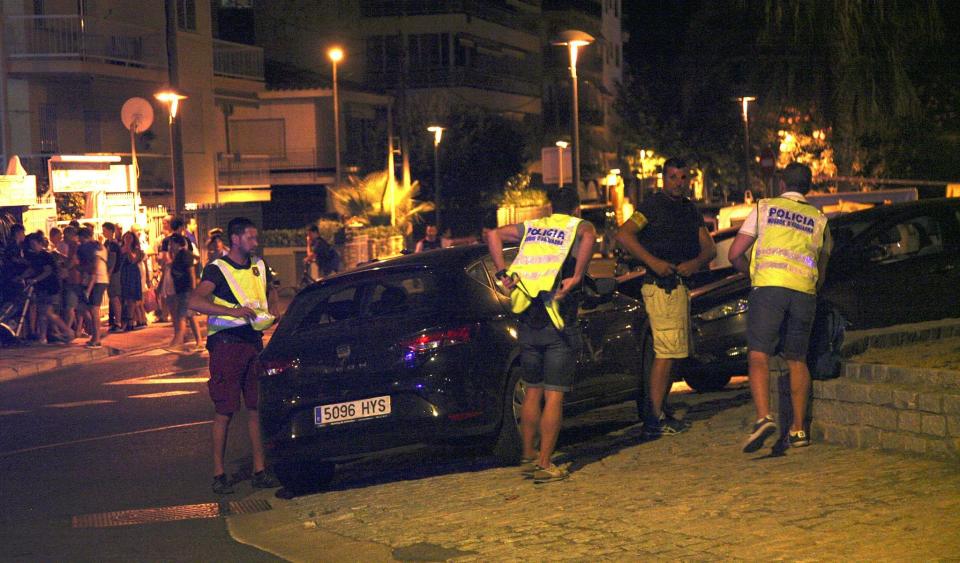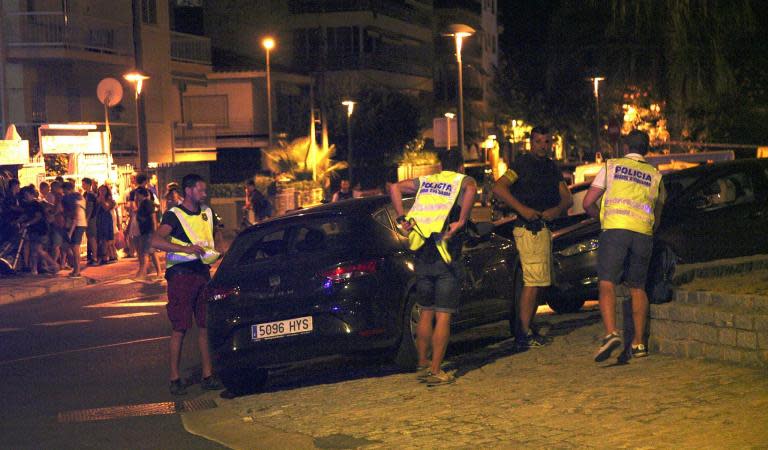Barcelona attack: Spanish police shoot dead five suspects to stop second attack after 13 killed in Las Ramblas
Spanish police say they have shot dead five suspected terrorists attempting to carry out a second attack in a seaside resort an hour away from Barcelona, where at least 13 people were killed and more than 100 injured by a van ploughing into crowds on Barcelona’s historic Las Ramblas.
Detectives say they believe the Barcelona attack and the later incident in Cambrils are linked. Six members of the public and a police officer were injured in the attack when the suspects ran them over in a car, before police shot them dead and carried out controlled explosions. Detectives are connecting the attacks to a house explosion down the coast on Wednesday, where people are thought to have been preparing bombs.
Police continue working to piece together the events that led to the Barcelona tragedy, with Prime Minister Mariano Rajoy saying it was a "jihadist attack". A manhunt goes on for those involved after the driver fled the scene on foot.
Two suspects were said to be in custody in connection to the attack last night, a Spanish national from the enclave of Melilla which borders Morocco, and a Moroccan. Neither were believed to be the driver of the van. Another man was shot dead by police having run over two police officers at a checkpoint around six miles away in the wake of the van attack, although authorities later revealed that the incidents were not connected.
And a third man was arrested on Friday morning in the Catalan town of Ripoll in relation to the Barcelona attack, according to Catalan radio.
Isis was quick to claim responsibility, which follows a number of vehicle-based atrocities over the last year. The jihadi group has repeatedly called for such attacks on European targets, although it is currently unclear whether those behind the attack had any direct connection to Isis.
The head of Catalonia’s interior department, Joaquin Form, said that the incident was “clearly a terror attack intended to kill as many people as possible” as he announced three days of mourning. Belgium was first to say that one of its nationals was one among the dead.
The van was said to have been driven down the pedestrian walkway from the top of Las Ramblas to near the city’s opera house. Witnesses on the scene told of hearing a “loud bang” followed by hordes of people screaming as the attack took place.
Emma Waterhouse, 24, who was with her family at the time of the attack, told The Independent: “We heard screeching noises and then screaming. Everyone started running in different directions and me, my mum and sister jumped on to the pavement behind a pillar as the van sped down the street.
“My dad ran across the road to join us as he had gone in the other direction and said there were lots of bodies. He saw people being hit.
“The van ploughed into the seating outside restaurants and people were struggling to run away because of the chairs,” she added. “Everyone was running to the sides of the street and then either into shops or down the side streets... We are in shock. I honestly thought the van was going to hit us.”
Mr Form warned that the death toll was likely to increase thanks to the nature of some of the injuries, although the humanity of people in the city was also on display with long queues forming to give blood to help the victims.
Ethan Spibey, 25, told The Independent there was a “stampede” as tourists and locals sprinted away from the scene of the attack.
He said: “I was with my boyfriend just about to cross Las Ramblas and all of a sudden there was an immediate stampede and police shouting at people to run. There was a stampede in the streets alongside Las Ramblas as everyone tried to run away. People were running into shops and taking refuge in cafes. There was a lot of screaming.”
“People just turned and sprinted in the opposite direction as the police were screaming at people to run away. They were telling people to get away as soon as possible. It was very scary.”
By Thursday evening, the usual bustle of the city centre streets was gone, as tourists and locals stayed away from Plaza Catalunya and Las Ramblas. Police blocked off all entrances to the area where the attack took place, causing the odd moment of tension between officers and people trying to get through.
“For God’s sake, there has been a terrorist attack here,” shouted one at a citizen who was refusing to turn back, but mostly the mood was quiet, as people tried to take stock of what had happened.
Mr Spibey said he had taken refuge in a church and was locked in as police dealt with the scene. “My boyfriend and I have come into a church with about 80 people, tourists and Spaniards,” he said. Shoppers in the Corte Ingles department store were forced to stay in the shop for two hours after the attack while the shutters came down in many other outlets surrounding La Rambla, the main thoroughfare in the district.
Robert Yelito, a US citizen but resident in Madrid, was trapped in one with his husband, where they were forced to stay for an hour until the police let them out.
It is not clear how many were involved directly in the attack, although the two arrests came in two separate towns in the region of Catalonia, Ripoli and Alcanar – the latter was the location for the explosion in a house on Wednesday that police said appeared to be linked to the van attack. That explosion killed one person and injured another.
Police also released the image of a man named as Driss Oukabir, whose documents were allegedly used to rent the van involved in the attack.
But local reports later suggested that a man had walked into a a police station in Ripoli, a small town around 90 miles north of Barcelona, identifying himself as Mr Oukabir.
He was said to have told officers that that his 18-year-old brother Moussa, who lives in Barcelona, had stolen his documents. The elder brother is thought to have been arrested in connection with the atrocity.
Following the van attack leaders from Spain lined up to condemn it – with the tragedy striking at the height of tourist season. It was the deadliest attack in Spain since March 2004, when Islamist militants placed bombs on commuter trains in Madrid, killing 191 people and wounding more than 1,800.
Taking to Twitter, the Spanish royal household said: “They are murderers, nothing more than criminals who are not going to terrorise us. All of Spain is Barcelona. Las Ramblas will go back to being everyone’s”.
Leaders from around the world also sent messages of support. Prime Minister Theresa May said that the “the UK stands with Spain against terror”, while French President Emmanuel Macron tweeted: “All my thoughts and solidarity from France for the victims of the tragic attack in Barcelona. We will remain united and determined.”
Donald Trump said that the US will do “whatever is necessary to help,” tweeting: “Be tough and strong, we love you!”
For now the investigation goes on. Catalonia’s regional president, Carles Puigdemont, told Barcelona broadcaster TV3: “Our priority is to save lives. And our second priority is the police investigation, to find the people responsible of this attack and anyone who has helped them directly or indirectly.”

 Yahoo News
Yahoo News 

